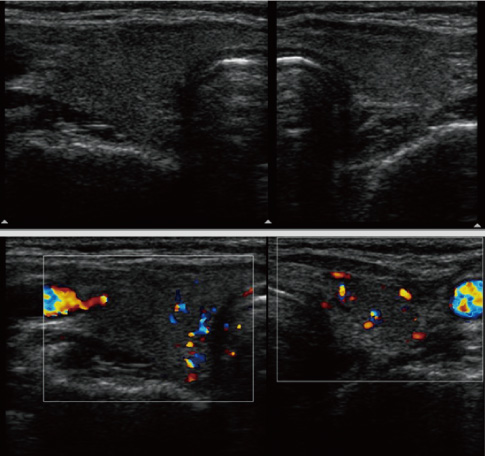Endocrinol Metab.
2012 Mar;27(1):68-71. 10.3803/EnM.2012.27.1.68.
A Case of Sunitinib-Induced Destructive Thyroiditis
- Affiliations
-
- 1Department of Internal Medicine, Kosin University College of Medicine, Busan, Korea. yschoi@kosinmed.or.kr
- KMID: 2134821
- DOI: http://doi.org/10.3803/EnM.2012.27.1.68
Abstract
- Sunitinib is a multi-targeted tyrosine-kinase inhibitor used for gastrointestinal stromal tumors and renal cell carcinoma (RCC). Several recent studies have reported sunitinib-induced hypothyroidism and thyroid dysfunction; however, the underlying mechanisms are not clear. Here, we report a patient with metastatic RCC, who developed destructive thyroidtis due to sunitinib treatment. The course followed in this case may be useful in understanding the clinical course of sunitinib-induced thyroiditis.
Keyword
MeSH Terms
Figure
Reference
-
1. Adams VR, Leggas M. Sunitinib malate for the treatment of metastatic renal cell carcinoma and gastrointestinal stromal tumors. Clin Ther. 2007. 29:1338–1353.2. Desai J, Yassa L, Marqusee E, George S, Frates MC, Chen MH, Morgan JA, Dychter SS, Larsen PR, Demetri GD, Alexander EK. Hypothyroidism after sunitinib treatment for patients with gastrointestinal stromal tumors. Ann Intern Med. 2006. 145:660–664.3. Faris JE, Moore AF, Daniels GH. Sunitinib (sutent)-induced thyrotoxicosis due to destructive thyroiditis: a case report. Thyroid. 2007. 17:1147–1149.4. Grossmann M, Premaratne E, Desai J, Davis ID. Thyrotoxicosis during sunitinib treatment for renal cell carcinoma. Clin Endocrinol (Oxf). 2008. 69:669–672.5. Ahn HY, Lee EK, Choi HS, Lee EJ, Lee YJ, Kim KW, Lee SH, Im SA, Park YJ, Park DJ, Cho BY. The clinical characteristics of hypothyroidism after sunitinib treatment in a Korean population. Korean J Med. 2009. 76:37–43.6. Lee HY, Kim MK, Kim NK, Kim HS, Ryu SY, Kwon KY, Park KG. A case of thyrotoxicosis after sunitinib treatment. Korean J Med. 2010. 78:503–506.7. Vialettes B, Guillerand MA, Viens P, Stoppa AM, Baume D, Sauvan R, Pasquier J, San Marco M, Olive D, Maraninchi D. Incidence rate and risk factors for thyroid dysfunction during recombinant interleukin-2 therapy in advanced malignancies. Acta Endocrinol (Copenh). 1993. 129:31–38.8. Lazarus JH. The effects of lithium therapy on thyroid and thyrotropin-releasing hormone. Thyroid. 1998. 8:909–913.9. Koga M, Hiromatsu Y, Jimi A, Toda S, Koike N, Nonaka K. Immunohistochemical analysis of Bcl-2, Bax, and Bak expression in thyroid glands from patients with subacute thyroiditis. J Clin Endocrinol Metab. 1999. 84:2221–2225.10. Martino E, Bartalena L, Bogazzi F, Braverman LE. The effects of amiodarone on the thyroid. Endocr Rev. 2001. 22:240–254.11. Tomer Y, Blackard JT, Akeno N. Interferon alpha treatment and thyroid dysfunction. Endocrinol Metab Clin North Am. 2007. 36:1051–1066.12. Sato S, Muraishi K, Tani J, Sasaki Y, Tokubuchi I, Tajiri Y, Yamada K, Suekane S, Miyajima J, Matsuoka K, Hiromatsu Y. Clinical characteristics of thyroid abnormalities induced by sunitinib treatment in Japanese patients with renal cell carcinoma. Endocr J. 2010. 57:873–880.13. Kamba T, McDonald DM. Mechanisms of adverse effects of anti-VEGF therapy for cancer. Br J Cancer. 2007. 96:1788–1795.14. Baffert F, Le T, Sennino B, Thurston G, Kuo CJ, Hu-Lowe D, McDonald DM. Cellular changes in normal blood capillaries undergoing regression after inhibition of VEGF signaling. Am J Physiol Heart Circ Physiol. 2006. 290:H547–H559.15. Makita N, Miyakawa M, Fujita T, Iiri T. Sunitinib induces hypothyroidism with a markedly reduced vascularity. Thyroid. 2010. 20:323–326.16. Shinohara N, Takahashi M, Kamishima T, Ikushima H, Otsuka N, Ishizu A, Shimizu C, Kanayama H, Nonomura K. The incidence and mechanism of sunitinib-induced thyroid atrophy in patients with metastatic renal cell carcinoma. Br J Cancer. 2011. 104:241–247.17. Mannavola D, Coco P, Vannucchi G, Bertuelli R, Carletto M, Casali PG, Beck-Peccoz P, Fugazzola L. A novel tyrosine-kinase selective inhibitor, sunitinib, induces transient hypothyroidism by blocking iodine uptake. J Clin Endocrinol Metab. 2007. 92:3531–3534.18. Rini BI, Tamaskar I, Shaheen P, Salas R, Garcia J, Wood L, Reddy S, Dreicer R, Bukowski RM. Hypothyroidism in patients with metastatic renal cell carcinoma treated with sunitinib. J Natl Cancer Inst. 2007. 99:81–83.19. Wong E, Rosen LS, Mulay M, Vanvugt A, Dinolfo M, Tomoda C, Sugawara M, Hershman JM. Sunitinib induces hypothyroidism in advanced cancer patients and may inhibit thyroid peroxidase activity. Thyroid. 2007. 17:351–355.20. Wolter P, Stefan C, Decallonne B, Dumez H, Bex M, Carmeliet P, Schöffski P. The clinical implications of sunitinib-induced hypothyroidism: a prospective evaluation. Br J Cancer. 2008. 99:448–454.
- Full Text Links
- Actions
-
Cited
- CITED
-
- Close
- Share
- Similar articles
-
- A case of thyrotoxicosis after sunitinib treatment
- Sunitinib-induced hypothyroidism
- Interferon-Alpha-Induced Destructive Thyroiditis Followed by Graves' Disease in a Patient with Chronic Hepatitis C: A Case Report
- The clinical characteristics of hypothyroidism after sunitinib treatment in a Korean population
- Sunitinib-induced hypothyroidism




